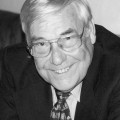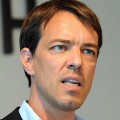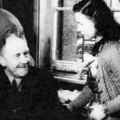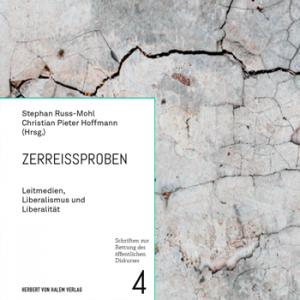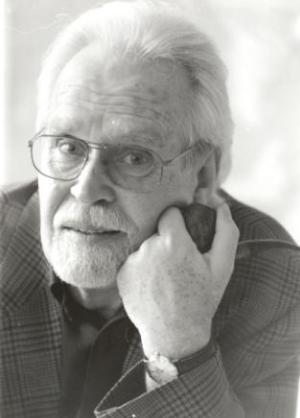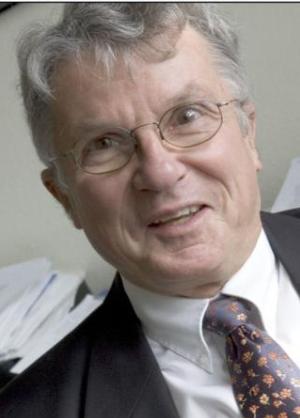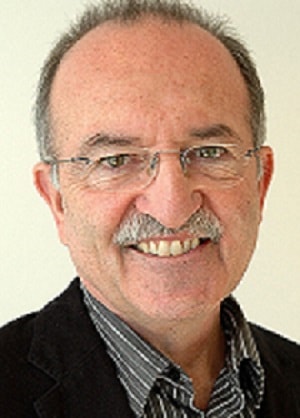Stationen
Born 1949 in Bad Kreuznach. 1975 Magister in Publizistik, University of Mainz. 1977 Assistant Professor, University of Dortmund. 1978 University of Mainz. 1981 Dr. phil., 1989 Habilitation (postdoctoral dissertation). 1993 Professor at Dresden. 1995 WAPOR President, 2004 ICA President. 1988-1994 managing editor, 1999-2010 editor, International Journal of Public Opinion Research. General editor of the International Encyclopedia of Communication (Wiley-Blackwell, 2008). 2010 ICA Fellow. Married, one son. Died on July 26, 2015.
Could you tell me something about your parents and about your first professional dreams?
I grew up in a lower-middle class family. My father worked for a car company and my mother was a housewife. There was no higher education in the background. Not much input in terms of literature, music or arts and not any particular relationship to the media despite the fact that my family had always subscribed to the local newspaper. When I was getting close to my high school exam, I looked into two possibilities: one was diplomacy because I was rather good in foreign languages and the other was journalism.
How did your parents react?
They didn’t like either of these ideas and said I should do something which is more in the mainstream. That’s why my first enrolment was in economics.
You changed your subject very quickly.
When I came to the university, a lot was happening on campus and on the streets. I’m a part of the 1968 generation. I still remember the gap between the abstract models we were talking about in economics and the reality in society and politics. That was frustrating. I was looking for something else and found in my university’s class listings a lecture on mass media and elections and about being a foreign correspondent. This lecture was by Peter von Zahn, one of the most famous German journalists who then had a regular TV show. All of this was much closer to what I was interested in. So, I switched to communication.
What about your parents?
My mother accepted almost everything that I proposed. My father was reluctant because he smelled the political impetus and was not sure how serious this was in terms of a professional career. On the other side, his son was able to debate with his friends. I don’t think that my father agreed with all of my political thoughts but he saw that I was good in rhetoric and could make a point here and there.
Was he a member of a political party?
No. My grandfather was a nominal member of the NSDAP. He worked for German customs. Later, he became the president of a pensioners association. As a schoolboy, I helped him to do the clerical work: writing letters to the members, printings and so on. I had to become orderly because he was it.
How would you compare the student Wolfgang Donsbach with your students today?
Students at that time were much more political and much more outspoken than students today. The climate was completely different. To meet the expectations of your fellows, you had to be very critical, tough on the authorities and almost against everything. There is a second point: We were much more committed to values and to political problems. When I look back, not everything was okay but at least we had goals and were committed to them. This is something that I’m missing today.
Does the university teacher Wolfgang Donsbach combat this indifference?
My introductory lecture is four hours a week. I always invest some of my class time for what I would call an “indoctrination” for the public interest, particularly with the younger students. It is not indoctrination for a particular value system but to care about society and about the quality of the media. Just don’t take everything for granted. Think about it and don’t forget that somebody has to do something so that we achieve a certain quality.
All of us are idealizing the past.
Students today are much more independent than we were. I don’t know what is more important but in this one aspect, there are clear indicators. The biggest deterioration was in the 1980s. The new generation had enough of everything: welfare, cars, freedom and no wars. Why should they care?
Manfred Rühl remembered discussions with students in Mainz and especially with Wolfgang Donsbach about the academic training of journalists (Meyen/Löblich 2007: 93). Why were you interested in this special topic?
I’m still interested in it. Just today, I talked about this topic in my class. Journalism education is at least as important as medical education. We are very strict with our doctors. There are laws for that. Who has the right to cut your stomach and take out the appendix? But we care very, very little about those who tell us what is going on in politics and other parts of reality. Journalists not only influence media quality, but also the judgements and cognitions of citizens who run our society. You cannot just be aware of all studies that have been done on media effects and then not care about those who produce the content.
Is communication able to train journalists?
It is, yes. Communication should be the centre institution of this training, but communication research can’t be the only content of the curricula. I did an expertise for Harvard together with Tom Fiedler. There we talked about the five competencies of journalists (Donsbach/Fiedler 2008). What our discipline can offer is what we call the process competence. Journalists should be able to understand why they do certain things and how these things have an effect on the audience.
What about the other four competencies – general, practical, subject, professional ethics?
The question is how do you organize that journalists get all this knowledge? In an ideal world, it is organized by one single institution. By nature that institution would be a department of communication, which has to cooperate a lot across disciplines and schools. We should take that problem serious and think about the identity of journalism in the first place. Many departments are going down dead-end streets now by saying there is no definition of professional journalism and that in the age of internet, everybody is a journalist.
Did you ever consider working as a journalist?
Oh yes. When I started communication, I wanted to become a journalist.
Why did you quit that goal?
The first hit against it was my own Magister thesis.
The one about the professional training in journalism?
Yes. It was an empirical study. I remember the Hollerith machine in the basement of the institute. We worked with punch cards. It was amazing to prove every hypothesis immediately. When you said it might be a relationship between variable 8 and variable 12, you could test it. I started to think in falsifications, proves and inferences. That sometimes drives people around me crazy. I’m so much trained in questioning claims about causality. This was triggered in me when I analyzed my little survey. When I was hired for my first fulltime teaching position at Dortmund, I was lost for journalism and I never regretted that – although this is a fascinating profession.
Who is more important for the birth of the scientist Wolfgang Donsbach: your teacher Elisabeth Noelle-Neumann or Hans Mathias Kepplinger who claimed it was him getting you back to Mainz?
The two things have to be separated. You must know that I was one of the leaders of the student’s movement in Mainz. We were giving Elisabeth hell with strikes and an occupation. Why should she ask somebody of this crew to become one of her assistants? Mathias knew me a little better and talked her into it. I was very surprised that Elisabeth had agreed to do that.
What about the intellectual influence of these two people?
I think it’s almost equal. From Elisabeth I got the general access to science and from Mathias the more detailed one. Elisabeth was a kind of generalist. She was convinced that she could tackle everything and was always ready to draw inferences from sometimes weaker data just to make the point. She was also more political in the application of her results and Mathias more saddle in his methods, especially in research designs and indicators. I took him as a model. He was male and closer to my age. Elisabeth was in a different class.
How did this model serve?
Very well. I’m very grateful that I had this model of a researcher. Mathias is somebody who does not go with the climate of opinion. If you look for new and unexpected ideas he is the one. I also admire his ability to combine theories and empirical research. He is much more theoretical than me. Everything he does is relevant, not just number crunching.
On your website you call Elisabeth Noelle-Neumann a friend. What was the core of this friendship?
It’s different from usual friendships. We had a lot of trouble and sometimes fun, but Elisabeth was a main part of my life. When I was a student, she was high class with her Mercedes Benz and a personal driver. Later, we had a working relationship and I became a colleague certainly with her support. After Simpson (1994) accused her, I organized a session at ICA, which helped her to overcome this situation because people like Elihu Katz took sides with her. That session brought me closer to her. She became weaker and needed people around her. I visited her twice when she was already unable to leave the house. The last time, she didn’t recognize me any more.
When you became a professor, where did you copy your teacher and where did you differ from her?
The way I led the department was very much influenced by what I had seen in Mainz. I wanted to have an efficient organizational structure with clear responsibilities.
Like a business?
A little bit. Be efficient, be on time. I also copied the methodological practicum and the colloquium. These forms of classes create a cooperative mood. Like in Mainz, I started an association of the departments’ friends with local institutions that supported us; and conducting socially relevant research, of course.
Being linked to the Mainz School: Is this more a burden or more of a delight to you?
Most it’s delight, particularly when others talk negatively about us. Sometimes those arguments are very unsubtle if you think of all the people who are counted as Mainz School like Hans-Bernd Brosius, Jürgen Wilke or Klaus Schönbach. The common denominator of us is first: empirical thinking and having proof to what you say. One cannot just make new books out of old ones but rather bring new evidence. The second is: being bold enough to go against PC and climates of opinion. That’s what people like Hans-Bernd or Jürgen have always done. That’s something that I hope to have learned. As we can all read in The Spiral of Science it is not easy to do that (Noelle-Neumann 1993). The Mainz School may find that it’s the opposite of common sense, maybe sometimes on the basis of weaker data but go for the more provocative argument and not the one that’s easy to digest.
Did you ever consider applying for a position in the US?
Yes. I interviewed for one position. It would not have worked out if they picked me because of family reasons. Salary is also an issue. I have a professional woman and I cannot just tell her to colour her fingernails all day while I pursue my career. After retirement, maybe I will take a part time position; it would be nice. I am going to a lot of places very often and for the rest, I am happy to be here and to have this department. It’s a small department and it still depends very much on individual people.
Could you name the main goal of all your activities abroad?
The first goal is a very egoistic one. I want to encounter other cultures and meet other people. The second motivation is to do comparative research. If you do journalism research and you are restricted to what is going on in Germany, you just lack the criteria.
Do you like the role of a public speaker, a local celebrity?
Am I a local celebrity?
I think so.
Maybe I am. When I think of celebrities, I think of models. Yes, I like it. It’s part of my personality: that I am outgoing, is also a way to transfer our doing to the rest of society. When you look at the mission statement of our department you’ll find that we make a commitment to the region. I am involved with so many things, and people ask me to give a speech here and there. You are asked by journalists for interviews on current issues. I now have my own television show, a talk show on a small local channel. I also try to put in our research results.
Who is Wolfgang Donsbach: a scholar, a teacher, a research manager, a chairman of international organizations and meetings? What is the most important part of your academic life?
I hope it is research, but maybe communicating about research is the role that I can take the best. It was Elisabeth who once said to me, whether Mathias or I should give a talk somewhere: ‘You should do that. You are a popular speaker like me’.
It’s a gift.
Yes, it is a certain gift. I hope the second is the research. I like to sit with my assistants and my students and to talk about a content analysis and operationalizations. I like writing it up and I am also quite good in organizing myself and others. The Encyclopedia was much more administration than intellectual work. It’s about quality standards and routines so that you get it done in time. It has 1,331 entries and I had uploaded 1,330 on the day that was set three and half years before. There was only one, which came late. I won’t tell you who it was (laughing). Sometimes I am probably not very gentle to my collaborators; at least those who were in my closer environment. I can be very tough, very demanding and probably not always fair. You know yourself in those stressful situations. But I get it done. At high costs, but I get it done.
What is your definition of communication? What is the subject all about?
It is about what the particular researcher defines it. There is no global or national definition of communication. This makes us different from other disciplines. My access is very naïve. It is very taken from practice: What helps to solve the problems that communication research should solve? Why does society pay us? They want answers to certain problems. Should kids play with Nintendo? Do the media influence voting decisions? Is communication only concerned about public communication, or is it more practical to include interpersonal communication, or is it even more practical to include interpersonal communication in specific areas, like teacher-student or health? And then you have to see where the theories apply. I don’t think we have done that task yet in our field. That’s why we are still struggling. We also have different traditions. ICA is very broadly defined. I don’t know what’s going on in a lot of divisions just because I have no expertise in those fields. I also have no expertise in 60 percent of the content in the Encyclopedia.
60 percent?
Let’s go the other way round. I just could name my core areas: political communication, methods, media exposure, media effects, journalism and a little bit of reality perception through the media. This is also what you find taught in our department and probably in your department in Munich or in Mainz. The way that we in Germany define the normal department is much narrower than in many other countries (Donsbach 2006). Now with the internet, you don’t have to reinvent communication research, but of course, you have to incorporate more theories and findings of interpersonal communication because the borders between mass and interpersonal communication are blurring. But there is still a line when I write an email to you. I still say everything that’s for the anonymous public, is something we are dealing with because there you have certain peculiarities that can be researched with the same theories. Sociologists then can deal much better with that purely interpersonal and private communication.
All your statements about the subject call for relevance. Who decides, what is relevant?
I do (laughing). I think it’s possible to deduct criteria of relevance when you are living in the society. One of the sources is the democratic theory. We have ideas of what democracy looks like and we have ideas how we want people to interact with each other. I think everybody would agree that it is better to live with valid information than on false ones. It’s better to make rational discussions rather than emotional ones. So, I think everything that helps in this perspective is relevant. When I had the privilege to suggest the title for my ICA conference in New Orleans, I called it Communication in the Public Interest. Particularly the mediated communication should put the recipient in the situation that she or he can make an independent reality perception. From there, you can deduct almost all ethical and quality norms that you find in literature. It’s all about giving options to people. We need objectivity for all claims about reality and we need plurality when it comes to values. Then you can decide for every study that you do: Does it help to pursue this goal?
Where do you see the field in 2030?
Disciplines are rather stable, slow and lazy institutions. A lot will happen as a consequence of what is going on in the media. This has always been kind of a problem: Our field depends very much on the practical world. This is the strength and the weakness. When I started in 1969, there were four or five departments in Germany. Since then the field has grown at an almost unbelievable pace. But it’s also a weakness, because the field has to reinvent itself all the time. I think the relevance of our filed as we understand it will also depend on the development of people’s “duty to keep informed”. In our societies, the status and the quality of the public communication is one of the major indicators of the health of the society. That requires that enough people are interested in the news. Now, I see a decline there. Then, what we are doing here might become less interesting. That’s something that I fear. Well, we have to fight against it with relevant research.
Are there any other scientists than Elisabeth and Mathias, who you would call a role model?
Yes. Thomas Patterson at Harvard. He is my closest male friend and a great researcher.
Apple strudel and Einstein, I read about it (Patterson 2009).
Tom has a very rare combination of being just a normal man. I mean a male who is interested in sports and with whom you can have drinks and tease women and at the same time, be a serious scholar who writes very well. The way he writes is something I fight to learn from him. He is just much better. He has a lot of influence through his writing. I sometimes think: How would he have behaved in this situation? Maybe it’s particular when I am in English language environment that this happens to me, but he is that one. Of course Jürgen Wilke and Winfried Schulz were important for me. I admire them for what they have done but it was not as close as with these two or three people including Elisabeth. With Mathias, it was a friendship. We were about four or five times in Tunisia working for a project.
Looking back on 40 years in communication, is there anything you are especially proud of?
I think others should talk about that. When I look at the Encyclopedia, I think that is an achievement, as a German and being in a rather small department. It makes you proud and a bit sentimental when you see the twelve volumes sit on a desk in the US or in Munich. From this position here, having been asked to do that, it was even more important for me than the ICA Presidency.
Is there anything what you would do in a different way today?
First of all, I would publish the results of my Habilitation in a different outlet. It was a big mistake to put it in the European Journal of Communication (Donsbach 1991). Whenever I see something based on Cognitive Dissonance Theory, it’s not cited. It should be because I think it’s still the most voluminous and serious communication study on it. It was just a wrong outlet. I don’t think I could have done many things better. I should have learned how to lead a department and how to interact with colleagues earlier. This is typical to becoming a professor. Everybody expects you can do budgets, you can lead people, you can write applications, and that you can teach. Nobody really has all of these skills. What I would not do differently: I sometimes think I am much less an academic than many of my colleagues. My life is not centred only on academia. I have several feet that I am standing on. I like to play, to be social, to be a political head and to drive my Porsche. There is a variance in my life that’s really important to me. I sometimes think about, should I be more serious, more concentrated and spend more of my time with research only? And then I say, ‘Thank God, I have done the other things’.
What will remain when Wolfgang Donsbach is gone? What should remain if you could influence it?
Academically? I hope that we have more people who become journalists, who think about what their purpose is and what is the criteria that their work should be measured against. I hope that we have more young scholars who ask, ‘What is important for research? Who has a certain use from the work that I’m doing?’ I’m going for relevant things.
Literaturangaben
- Wolfgang Donsbach: Exposure to Political Content in Newspapers: The Impact of Cognitive Dissonance on Readers’ Selectivity. In: European Journal of Communication Vol. 6 (1991), S. 155-186.
- Wolfgang Donsbach: The Identity of Communication Research. In: Journal of Communication Vol. 53 (2006), S. 437-448.
- Wolfgang Donsbach/Thomas Fiedler: Journalism School Curriculum Enrichment. A Midterm Report of the Carnegie-Knight Initiative on the Future of Journalism Education. Harvard University: Joan Shorenstein Center for Press, Politics, and Public Policy 2008.
- Michael Meyen: 57 interviews with ICA Fellows. In: International Journal of Communication Vol. 6 (2012), Feature, S. 1460-1882.
- Michael Meyen/Maria Löblich: „Ich habe dieses Fach erfunden“. Wie die Kommunikationswissenschaft an die deutschsprachigen Universitäten kam. Köln: Herbert von Halem 2007.
- Elisabeth Noelle-Neumann: The Spiral of Silence: Public Opinion – Our Social Skin. Chicago: University of Chicago Press.
- Thomas E. Patterson: Wolfgang Donsbach 60 Jahre. In: Publizistik 54. Jg. (2009), S. 558-559.
- Christopher Simpson: Science of coercion: Communication Research and Psychological Warfare, 1945-1960. New York: Oxford University Press 1994.
Empfohlene Zitierweise
- Wolfgang Donsbach: I’m Going for Relevant Things. In: Michael Meyen/Thomas Wiedemann (Hrsg.): Biografisches Lexikon der Kommunikationswissenschaft. Köln: Herbert von Halem 2014. http://blexkom.halemverlag.de/going-for-relevant-things/ (Datum des Zugriffs).




